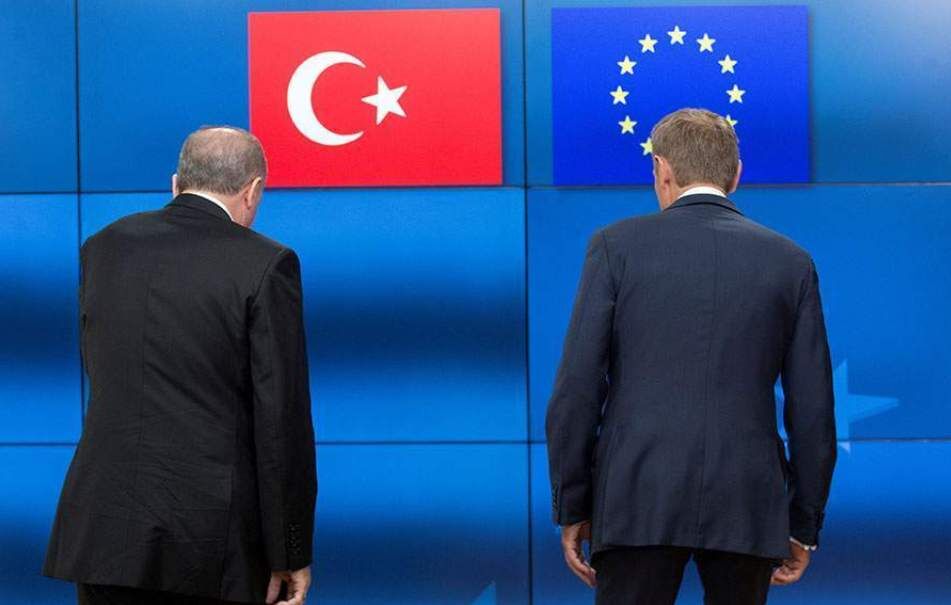Mahmoud Fazeli in an interview with the website of the Strategic Council on Foreign Relations, citing statements by EU Foreign Policy Chief Josep Borrell to cut EU aid to Turkey by up to 75% due to Turkish military operations in northern Syria and “unauthorized drilling” of oil and gas off the coast of Northern Cyprus in East Mediterranean, said: “EU relations with Turkey have never been stable and have changed according to Turkey’s position in various European or Mediterranean events.”
Rising Tensions in the Mediterranean
He added that tensions in the Mediterranean have escalated since last year due to efforts by Turkey, Greece and Cyprus to conduct gas exploration and drilling operations in the region, which has led to the intensification of old tensions. The European Union had on several occasions warned Ankara against the consequences of unauthorized gas drilling operations off the coasts of Cyprus. The European Commission also unveiled in September the sanctions mechanism against Turkey by targeting Turkish authorities and institutions active in drilling operations near Cyprus.
The former diplomat, however, emphasized that Turkey claims its drilling operations are taking place in its legal territory or in the Turkish-Cypriot sector. Of course, he added, Peter Stano, the spokesperson of the EU foreign policy chief has denied media reports that the EU had cut aid to Turkey. He said Burrell had not sent a letter to the European Parliament and that all media impression was completely misleading. He added a cut in Turkish aid related to pre-accession time as of 2017 and the latest decision by the Council on Foreign Relations was taken on the 15th of October last year.
Fazeli said the news on cutting EU aids to Turkey had prompted a response from the Turkish Foreign Ministry spokesman: “The EU, acting under the pretext of union solidarity, should first of all end its unrealistic, prejudiced, and double-standard policies.” Foreign Ministry Spokesperson Hami Aksoy also slammed what he called the European Union’s silence on the usurpation and violation of the rights of both Turkey and the Turkish Cypriots in the Eastern Mediterranean.
Fazeli said that the publication of news on aid cuts had triggered a reaction from the Turkish Foreign Ministry’s spokesman: Turkey believes that the EU, which works to consolidate trade union solidarity, must first abandon its unrealistic, fanatical and double standard policies. Turkey has also criticized the EU’s silence over what has been called a violation of the rights of Turkey and residents of the autonomous Turkish state of Northern Cyprus in the eastern Mediterranean.
Ankara’s Grievances over EU Support for Greece, Southern Cyprus
The EU affairs analyst said Turkey is complaining against continuing EU support for Greece and Southern Cyprus in the disputes particularly in energy exploration operations in the eastern Mediterranean, and referring to EU warnings to Turkey on continued development of energy resources in the Eastern Mediterranean he said: These warnings have always been disregarded by Turkey, followed by EU Council of Ministers sanctions, including “halting dialogue at high levels, cancellation of the EU-Turkey Association Council meeting, reducing financial aid in 2020, the recommendation to European Investment Bank to reconsider lending to Turkey and continue work on other sanctions options against Turkey.
Any Sanctions against Turkey Ruled Out for Now
Commenting on Turkey’s reaction to the EU move, he said: “After the EU retreat, it seems that any sanctions against Turkey at this time will be out of the question.” The EU had reduced its aids to Turkey before accession in 2017 and currently does not appear to have a plan for further cuts.
Following Turkey’s entry into Syria and the EU’s stance to impose some sanctions, evidence showed that the list of EU sanctions was not binding and was large of an advisory nature and no specific steps were taken against Turkey. If Europe were to take retaliatory action, it should have been done sooner.
He said some sanctions could create difficulties in transporting extracted gas from the Eastern Mediterranean to Europe, adding that some EU member states were aware that the extracted gas would be shipped via Turkey. In the past, and while Ankara was fighting the Gulen and PKK groups, the EU had warned Turkey to make some reforms in its anti-terror law; otherwise, it would end the negotiations.
Fazeli also said EU funding cuts to Turkey were first made in 2017 and then in October 2019 and currently, the EU budget allocation committee has no decision to further cut the aid.
Asked whether EU pressure could lead to a change in Turkey’s behaviour towards Syria, the former diplomat said: Erdogan remains firm on his position on the Syrian crisis. He claims that despite the ceasefire there are continuing violent acts by the Syrian government, which continues to force the Syrian refugees to migrate to Turkish territory.
Regarding the impact of European criticism on Turkey on increasing criticism of the AKP, he said: Erdogan and his party are in a special internal situation. Disagreement among former ruling party aides has led to the formation of a new party by former Prime Minister Davutoglu, who was once known as the party’s foreign policy theorist, again preparing himself for formal entry into Turkish politics.
Increased Criticism of Government’s Handling of Economic Crisis
Referring to the growing criticism of the Erdogan government’s handling of the current economic crisis in Turkey and the widespread crackdown on the opposition, some Turkish parties have supported early elections in recent days and are largely preparing for early elections.
Fazeli continued: The economic crisis and recession have diminished popular support for the AKP, which was also a sign of the recent defeat in Turkey’s municipal and council elections. The ruling Justice and Development Party is said to have lost 840,000 members in the past year alone, and the continuation of the fall is a serious challenge for Erdogan’s 16-year rule in Turkey. They predict that the fall of the AKP members will continue as the party has lost touch with its fundamental principles.










0 Comments